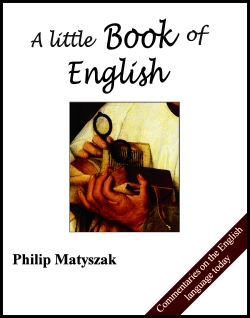|
The earlier Prof blog entries as well as some new articles are now available as a Kindle book from Amazon. We hope you enjoy it.

amazon.com amazon.co.uk
|
| 15 Novemver 2021 | | That Doesn't Mean What They Think It Does | 'When I heard that, my head literally exploded.' Either the speaker of that last statement belongs to an alien race or he was speaking from beyond the grave. To “literally” make a head explode requires something like a stick of dynamite inserted into the speaker's mouth. (Something which some exasperated grammarians are probably tempted to do.)
The most famous mis-speaker of all time is the fictional Mrs Malaprop, who notoriously misused words that she thought made her sound more educated and intelligent. However, it is interesting to see that modern journalists and celebrities are hastening to catch up. (The opening statement was by a particularly annoying celeb whose cerebral vacuity puts him at greater risk of implosion.)
While correct use of English has never been a requirement for fame, one would hope that journalists would do better – words are their trade after all. Yet these are the folk who supply 'factoids' in the belief that these are extra little snippets of factual information. However a factoid is properly defined as something that sounds like a fact, but actually is not. (Making some of these usages more accurate than the journalists may realize.)
Also scientists would prefer if over-excited reporters did not refer to their breakthroughs as a 'quantum leap', since a quantum leap is actually the smallest movement that can happen and still be described as such. And again, computer journalists reporting on new software often refer to a 'steep learning curve' as though it were a bad thing, rather than a graph showing amount of learning on the Y curve against time on the X. It is not a hill that you have to climb, folks. It's more like education taking off.
Which would be a good thing.
| | | | | 15 September 2021 | | Words aren't what they used to be | They were husband and wife, with a boy, (who was gay) and a girl. Their life was fantastic.
One of the issues with English is that meanings change over time. There are words like 'quite' which has kept its original meaning of 'exact and precise', while simultaneously developing the opposite meaning of 'vague and approximate'. Thus if you tell someone that they are 'quite right', the meaning is ambiguous, though it would have been clear two hundred years ago. So let us look at what our opening sentence might have meant a few centuries back to see some examples of linguistic pitfalls which await an unwary time traveller.
For a start, our husband and wife need not have been married. A 'husband' was a householder who owned the property, and 'wife' meant simply 'woman' – a term that survives in expressions like 'midwife' and 'old wives tales'. The 'boy' was a term for a young male servant, and a 'girl' was any young child. (The term only came to refer to young females relatively recently.) The boy was 'gay' because he was high-spirited and cheerful, and he probably liked girls since the 'girl' could be any gender.
Of course, this couple's life is imaginary, or 'fantastic' because that word originally meant 'of a fantasy'. Which is something to consider when you order a hamburger, and the waitress exclaims 'fantastic!' Given the speed of service in some post-pandemic restaurants, perhaps she really does mean 'Dream on, sucker!'.
| | | | | 15 July 2021 | | It's how you say it | If you have ever seen a spoken dialogue written down, you will see that it is very different from a text designed from the beginning to be read. Verbal English is an adventure, where people launch into sentences with little idea how they are going to get to the end, where metaphors go wrong, grammar gets mixed up, and sometimes the only thing to do is give up in mid-sentence and start again.
So pity the poor sports commentator who had to not only closely watch the action in the game, but also to report what he (it's usually a he) is seeing in real time, and do it smoothly and fluently. Some commentators develop little verbal tics to give their brains time to catch up with their mouths. There's one commentator who uses unnecessary future tenses - 'Jones will take a shot at goal' he says - three seconds after that shot is in the past. A colleague might say 'Jones is able to take a shot at goal', because just saying 'Jones shoots at goal' means that another sentence has to follow, and the commentator's brain has not yet prepared it.
And terrible things can happen when a commentator says something that has not been cleared by his mental censor. We all make such mistakes, but few of us make them live and on the record as commentators do all the time. Some classics include:
'They are the team in the blue jerseys, If you have a black and white TV set, that's the ones with yellow socks.'
'He had an eternity to make the pass, but he ran out of time.'
'She got a bronze medal at the Olympics, so no-one is better than her.'
'If he hadn't missed the goal, it would have gone in.'
'Scotland won the game 2-2.'
And my favourite based on the saying that a dedicated supporter bleeds his team's colours. 'If you cut Manchester United fans, most of them would bleed red.' | | | | | 15 May 2021 | | WTF is a TLA? | Users of tech gadgets have, over the years become familiar with the fact that their computers are largely made from TLAs. The TLA is, with delicious recursiveness, a TLA - meaning a three-letter abbreviation. So we might check that our CPU (central processing unit) and VDU (visual display unit) can handle a DVD-ROM (digital versatile disc with read-only memory) or whether there is a game on the HDD (hard disk drive) that we can play instead.
If that game is an online game with chat added - as are most modern computer games - you will be happy to know that the chat does not use TLAs- well, not just TLAs. In fact MMORPGs (massive multi-user online role-playing games) live up to their name by using one- to ten-letter abbreviations, to the extent that new players first have to learn abbreviationese as a second language before they can play.
It helps that the 'F' in most of these forms of typing shorthand stand for a common four-letter swearword, but even so conversations can get very cryptic when players are typing under stress while being shot at by Orcs/Klingons/space pirates or whatever form their particular online opposition takes.
WTF?
Dude, I'm GTG. OMW ETA <1 min
IDK by then I'm gibbed
So GTFO
I'm dead. LMAO
IMHO you were an AH to go in alone
FOAD
Let us expand this sad story. First our hero was confused by an ambush and asks what is going on. His friend says he is good to go help and is on his way. He estimates his arrival will be in less than a minute. Our hero says he doesn't know that will help, because by then he will be reduced to giblets. His friend says that he should get out quickly, to which - laughing his ass off - our hero says he has perished. In his friend's humble opinion the hero was an asshat for going in alone, which receives the reply that the friend should go away and die.
Eventually we're going to evolve a whole new language designed for high-speed online keyboard communication. Naturally we will have to call this HSOKC.
| | | | | 15 March 2021 | | Email errors
| Twenty years ago it was fashionable to lament the death of letter-writing. Then email came along and suddenly everyone was writing again. Indeed, so much so that a text-addicted younger generation are somewhat startled when one reminds them that phones can also be used for voice calls.
The problem with informal texting is that it has introduced several bad habits which are beginning to creep into more formal emails. So for the benefit of those who need to sound literate when (for example) applying for a job or college application, here are a few of the inveterate texter's common errors to avoid.
Using 'of' as an auxiliary instead of 'have'. For example 'I would of done that earlier, but no-one told me I had to.' Yes, when 'would have ' is abbreviated to 'would've' the ending sounds like 'of', but there's still no reason to write it that way.
Odd capitalization. For example 'My Application to West Coast university was sent last thursday so this Follow up is with the Information which mr Jones requested.' Capitalization can be tricky even for professionals, so when in doubt, check.
Grocers' apostrophes. For example 'The book's that you recommended were unavailable.' If it's not an abbreviated 'is' (see before) or a possessive, don't use an apostrophe. Also note that 'its' as a possessive does not have an apostrophe. It's a complete word, not a short form.
'Your' and 'you're'. As is sometimes remarked 'Grammar is the difference between knowing your crap and knowing you're crap.' The same goes for 'their' and 'there'.
Finally get your pronouns right. For example you can see how odd 'He told Bill and I to come tomorrow', actually is if we remove Bill. 'He told I to come tomorrow'. Seriously?
Remember, there's no point in trying hard to impress with a well-crafted letter or email if your grammar lets you down anyway. When in doubt, check, and preferably with a human - computer spelling and grammar checkers can make some very odd Miss Streaks.
| | | |
page 1 page 2 page 3 page 4 page 5 page 6 page 7 page 8 page 9 page 10 page 11 page 12 page 13 page 14 page 15 page 16 page 17 |
|
|

